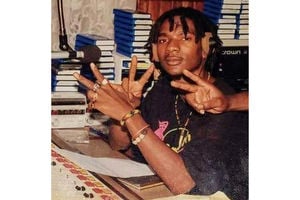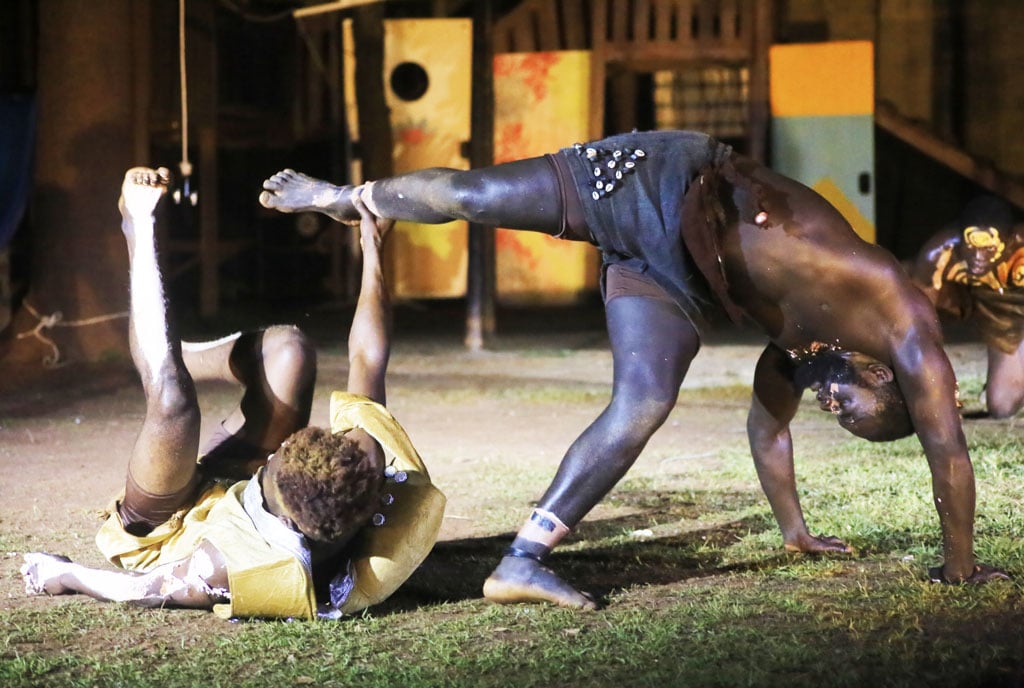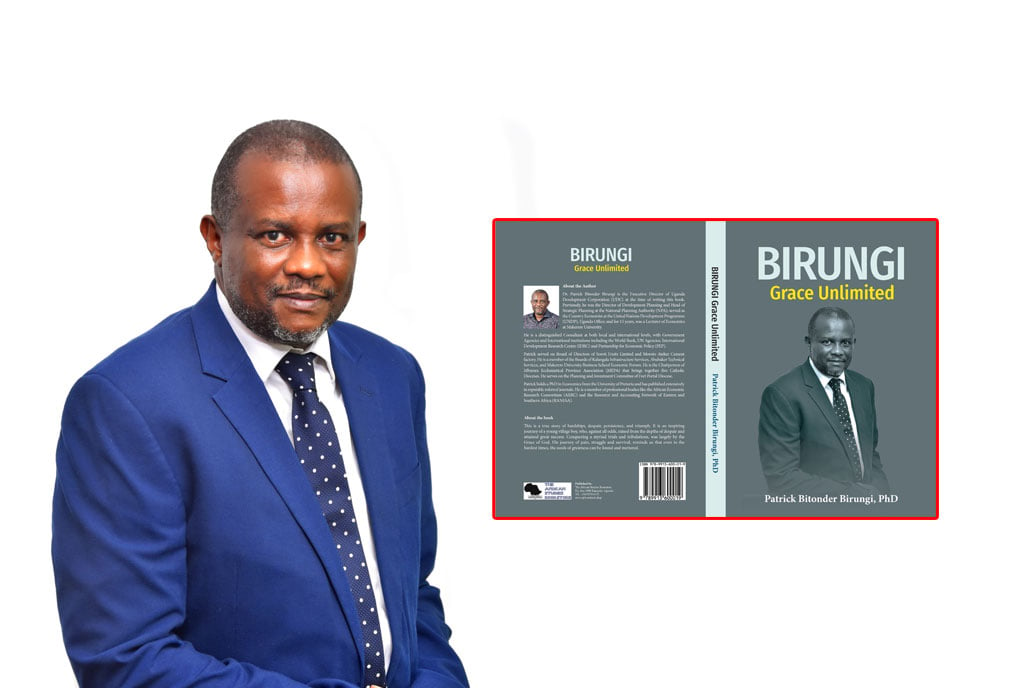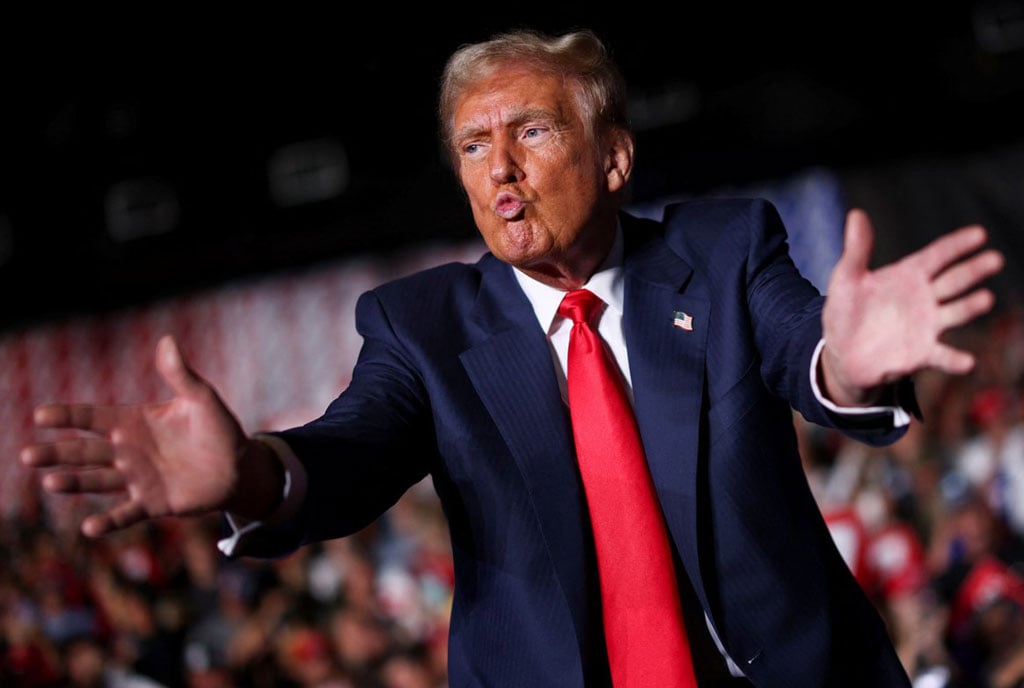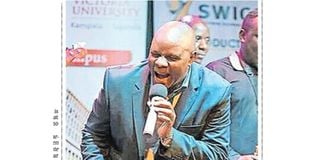
Veteran artiste Diplock Ssegawa during a recent performance at the National Theatre in Kampala is credited for recording a nine minute advert in 1987, the longest in the country's history. PHOTOS/COURTESY
The transition of FM radio in Uganda in the early 90s was met with many opportunities. Musician Ragga Dee real name Daniel Kazibwe mentions that this is when the Deejay job started to gain respect locally.
He notes that music radio hosts progressively imported freestyling from dance clubs to on air shows birthing fully established musicians such as Emperor Orlando, Rasta Rob, and Menton Summer among others.
He reveals that because freestyling was a thing at that time, radio hosts would bank on musical freestyling to deliver radio mentions to sway customers.
Kazibwe shares that this is how musicians Menton Summer and Orlando came up with the idea of a music inspired radio commercial called; Silikawo baby an advert for a baby jerry - Sleeping Baby - which had been locally named Silikawo Baby.
Produced with recurring patterns of unstressed syllables, the advert which was recorded in both Kiswahili and Luganda encourages Ugandans to use the baby jerry for their babies’ comfort.
The advert eventually became a local lullaby and later recorded as a song for which Kazibwe says did not only become a club anthem but also played by Deejays at events.
He adds that few people would notice that the song was literally a radio commercial to the fact that it was dubbed on compact Cassettes for home consumption.
Kazibwe, however, notes that the concept of music commercials had existed earlier when pharmaceutical entrepreneur, Canon Ddungu initiated the famous Kyapampalaasi advert.
Kyapampalaasi advert, a radio commercial for a medicinal ointment called Kyapampalaasi, became very popular in the 60s, 70s, 80s and early 90s.
Swayed by Swico
When singer Diplock Ssegawa recorded Uganda’s first modern wedding song, Sooka Omunonye his friend John Ssemondo who was then working with State Wide Insurance (Swico) convinced the company’s marketing team that a musical advert would advertise the company better and he tipped Ssegawa for the job.
In 1987, he recorded Uganda’s longest radio advert which run for nine minutes at Andrew Crawford studios in Kenya.
At the time, he was paid Shs2000 to do the advert which was intended to sway Ugandans to insure their products with an insurance company called SWICO. However, it literally became a song for everyone including those who were never interested in insurance services.
He mentions that the Swico advert is one his longest projects to the fact that he re-records the advert every after 10 years.
Chai Garden tea, Nywa nga Chai Garden tea, Chai Garden tea….. Garden amalako enyonta akuwa amaanyi ate nga Muwoomu. An advert for popular tea leaves, Garden Tea is one of the most nostalgic music inspired radio commercial in Uganda’s advertising history.
Musician Diplock Ssegawa shares that the commercial produced by the late Edmund Batte and voiced by late Kezia Nambi became an addictive lullaby for children given its musical touch that would enable them to sing along.
Bosco Kataala befell us
As MTN- Uganda looked to boost their service dubbed MTN MoMoPay, a story of a village man in the city who attempts to use cashless idea was birthed in form a music inspired advert dubbed Bosco Kataala.
The advert was crafted with captivating humour with an authentic local sound that made it relatable to the local audience, prompting people to sing along to it.
Featuring a comical character Bosco, a little known actor real name Siraje Kasirye, the advert was created by local music label Swangz Avenue together with Yese Oman, who happens to be singing diva Vinka’s song writer.
Mistaking a Congolese Volkswagen for a song
Artiste Jack Kinobe Sserunkuuma shares that in the 70s, Congolese singer Franco Makiadi Luambo was a household name in Uganda.
One of his most famous infomercials was the song AZDA released in 1973 a song that was popular at parties, bars and it enjoyed airplay on Radio Uganda.
On his YouTube channel, Rhumba music expert James Angana shares that the song was an advert for Volkswagen dealership in Congo known as Association Zairoise d’Automobiles or AZDA for short.
Singing Nako kumba baninga, VW, problem ezali te, Eloko endimami na Zaire Vw, Vw, Vw, Vw, Commander na Azda, Azda kombo ya sika literally meaning, I will carry friends, Volkswagen has no problems, Volkswagen is accepted in Zaire, Order from Azda, Azda a new name. He praises the car brand while calling his fellow countrymen to choose Volkswagen.
Although Congolese music is loved for its buoyancy, when Luambo sings ‘vay-way vay-way vay-way vay-way,’ he is saying VW as gorgeously as anyone has ever uttered those letters. He applies his declarative baritone to come up with simple recurring patterns.
Elsewhere in the world
According to music website, Sync Summit, music written specifically for ads accounts for between 40 – 60 percent of all music used for ads and brand campaigns in the United State alone.
There a number of songs that was originally written for and used in commercials, that later became ‘Commercial Hits,’ charting as hits in the general market.
Before the notoriety for his off-stage antics, in 2006-2007, Chris Brown wrote and recorded what is arguably the world’s best song for a chewing gum commercial ever, dubbed Forever (Wrigley’s/Chris Brown – BBDO).
The song ‘Forever’ was commissioned by BBDO as part of a project featuring three pop stars (the others were Ne-Yo and Julianne Hough) to give three of Wrigley’s brands a refresh (Double mint, Big Red and Juicy Fruit), but this one was by far the standout song.
Kekana and Coke’s One Billion Reasons to Believe in Africa
In 2012, soft drinks company, Coca cola rekindled memories of the wave of South African pop music that invaded Kenya and the rest of the continent in the mid to late 1980s.
Although the original song was recorded in 1984, All I Need, became one of the most attractive audio-visual advert across the African continents.
The scenes in the TV advert for the campaign dubbed ‘One Billion Reasons to Believe in Africa’ were shot in Kenya early that year, with Kekana and children from various schools in Nairobi.

